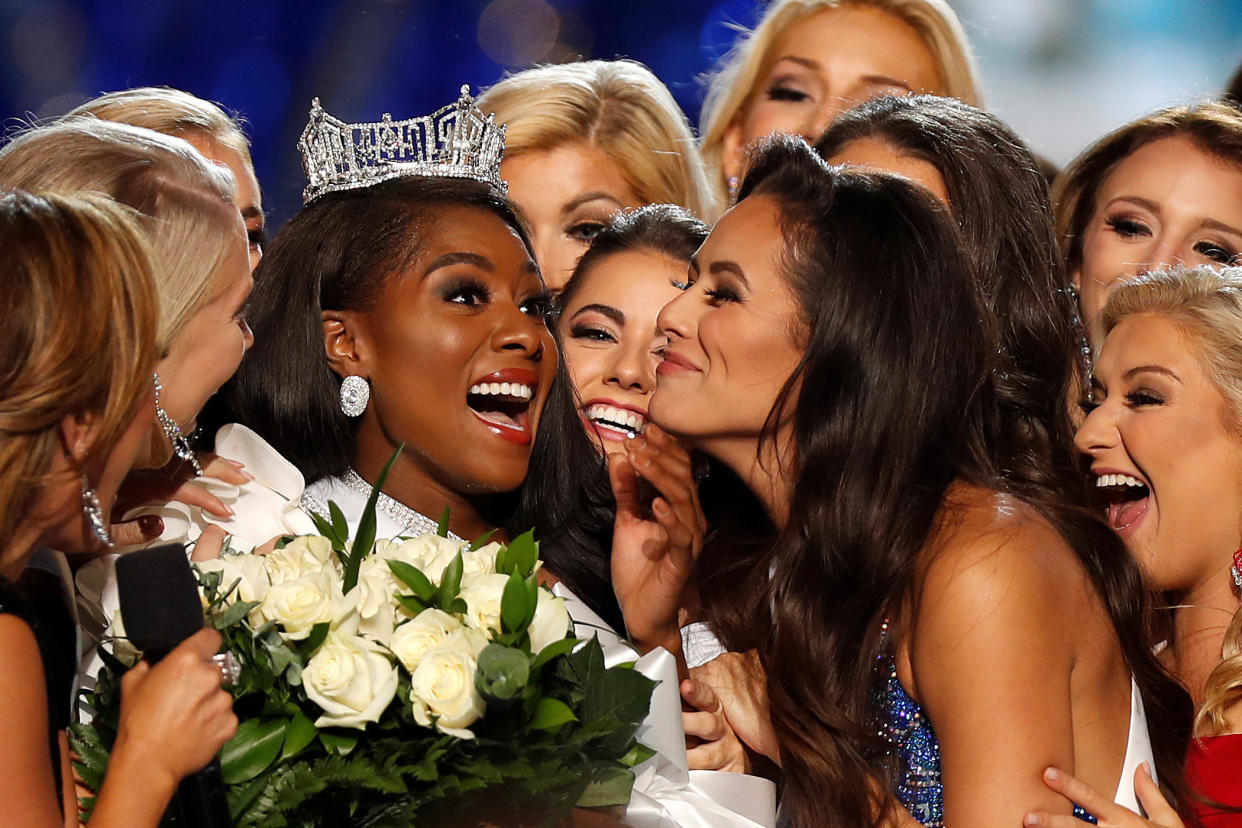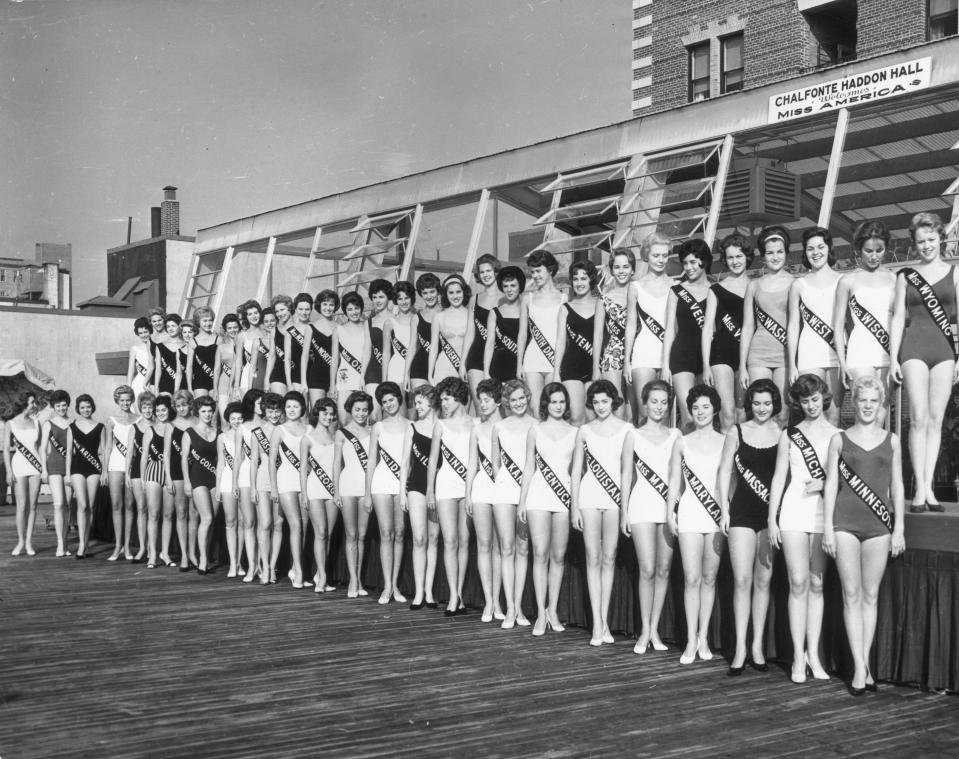New Miss America glad swimsuits nixed from competition, but fans disagree: 'Terrible'

Miss America 2019 swept into Atlantic City, N.J., on Sunday night along with heavy rains and high winds — a fitting combination, considering the storm of controversy brewing in and around the 93-year-old annual event.
Broadcast live on ABC, the competition conveyed none of the drama that has beset the Miss America Organization since a change in leadership this past year. A key issue was the decision to drop the swimsuit portion of the competition, fitting for the #MeToo moment but unpopular with many in the pageant community. On Sunday night, a warm-up announcer was met with loud boos when he reminded the audience that the swimsuit portion of the competition was no more.
The new Miss America welcomes the shift. “These changes, I think, will be great for our organization,” Nia Imani Franklin told reporters shortly after being crowned. “I’ve already seen so many young women reaching out to me personally as Miss New York asking how they can get involved, because I think they feel more empowered that they don’t have to do things such as walk in a swimsuit for a scholarship.
“I’m happy that I didn’t have to do so to win this title tonight, because I’m more than just that, and all these women onstage are more than just that,” Franklin said.
But attendees at Boardwalk Hall had plenty to say about the revision to their beloved American icon.
“Terrible.” That’s how Molly Patterson, who was in Atlantic City to support her friend, Miss Oklahoma Ashley Thompson, described the change. It was announced in June, just months after Gretchen Carlson became board chair (soon prompting representatives from 22 state pageants to call for her resignation). It followed a trend — Miss World eliminated swimsuit competition in 2014, followed by Miss Teen USA in 2016 — but nevertheless surprised many inside as well as outside the pageant world. And some were still fuming about it Sunday.

“I don’t want that to change — it’s tradition, and that’s coming from a contestant,” said Patterson, who had competed in her home state.
“I don’t see it as exploitive,” said Kim Lefelar, who had come from Potomac, Md., to support Miss Maryland. “I see it as a representation of hard work. I like the element.” Gesturing to the throngs moving through the lobby into the theater — a great many of them bedecked in elaborate satin or sequined gowns and spiky heels —Lefelar added, “I like the pageantry, the unexpected glamour. It is in the lifeblood of the female species, like it or not.”
“I don’t like that they dropped the bathing suits — that’s how it all started,” echoed longtime Miss America fan Kregar Benedict, of Los Angeles, referring to the fact that the pageant had begun in 1921 as the Atlantic City Bathing Beauty Contest, a way to extend the summer season past Labor Day. His wife, Eileen, added, “I liked it because it showed how physically fit the girls were. It made me think, wow, they’re smart, beautiful, and fit. … They did it tastefully.”
The newly rebranded “Miss America 2.0,” always known as a pageant, is now officially a “contest,” while contestants are now “candidates.”

“They’ve changed the words, but when you’re changing the fundamentals of what the program stands for, that’s where I have a problem,” said Elizabeth Craig, mother of Miss Utah Jesse Craig. She said she was “not thrilled” with the changes, particularly the jettisoning of the swimsuit portion.
“This is an arena and a niche for girls who want to be well-rounded, young women who want to be excellent,” Craig said. “The majority of us wanted to keep the swimsuit competition,” she said, adding that she had won the swimsuit competition in 1991 as Miss Utah. “It’s not just a physical thing. It’s a mental thing. There is an empowerment that comes from that kind of work and dedication.”
Craig also called out Carlson, Miss America in 1989, for her attempts at rebranding the event. “Gretchen was a woman who benefited from the traditional program and then obliterated it.”
Carlson was not doing any press interviews Sunday. She took neither the stage nor the podium at the post-broadcast press conference (although she sat in that small audience, then quickly ducked out as it ended).
Those offering more measured opinions included Jessica Sales, Miss America Outstanding Teen Florida, who waited in a long line Sunday afternoon to score autographs and selfies with a lineup of former Miss America titleholders: among them Lee Meriwether (1955), Susan Powell (1981), and Ericka Dunlap (2004). “[The swimsuit decision] is kind of double-sided,” Sales said. “I think, for a lot of girls, it motivates them to eat healthier. Others, it makes them uncomfortable. It’s going to take some getting used to.”
Rachel Spencer, 11, who has been competing in the Miss Maryland system for several years, was also democratic. “It’s classic. It’s what you think of with Miss America,” she said. “But it’s also a great step. It’s all about making people feel comfortable, so I think it was a good decision.”
Judith Ann Graham, a former Miss New York (1973) who was resplendent Sunday in a red satin gown, said, “I think what they’re trying to do is take a corporate approach, and I don’t think it’s a bad thing nowadays. They are looking for the best candidate for the job of Miss America. So swimsuits? I don’t miss it. I’m actually encouraged by the changes. I know a lot of people are going in kicking and screaming. But it’s time to bring Miss America into the year 2019.”
Read more from Yahoo Lifestyle:
There she is, Miss America 2.0: Can the contest survive its swimsuit-free reboot?
Miss Michigan wins over Miss America viewers by addressing the Flint water crisis
Follow us on Instagram, Facebook, and Twitter for nonstop inspiration delivered fresh to your feed, every day.

